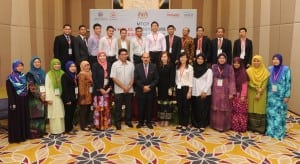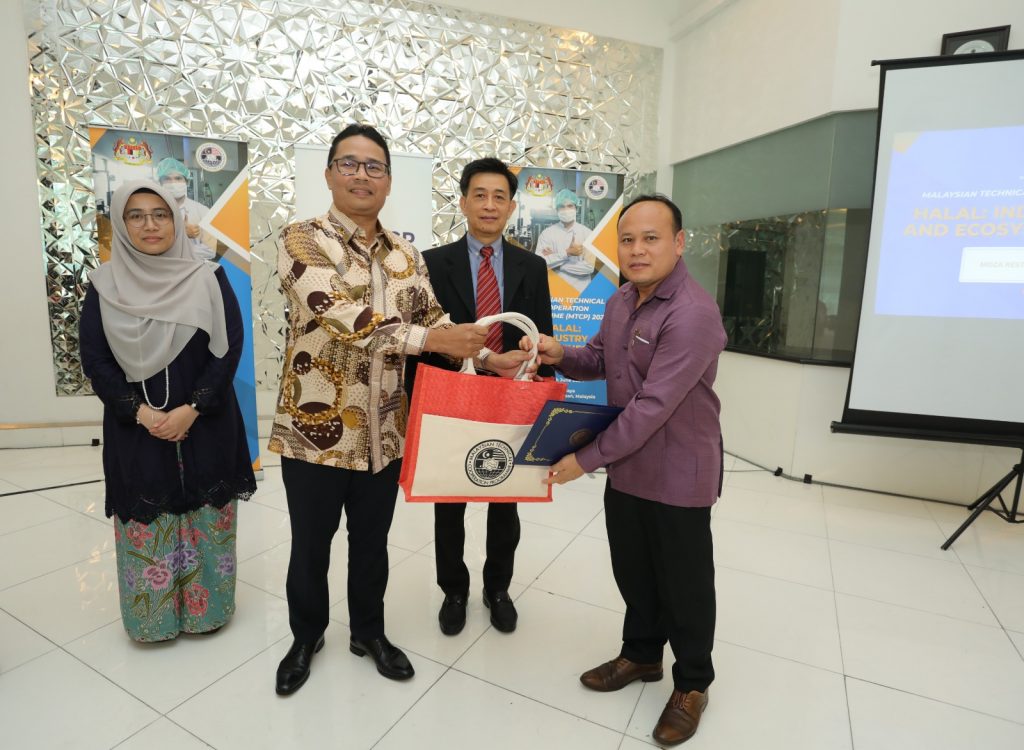
10 participants from five (5) ASEAN Countries Visit Malaysia for Technical Training and Capacity Building
PUTRAJAYA, May 12, 2015 – The National Standards and Accreditation Body, Department of Standards Malaysia (Standards Malaysia) today announced the Malaysian Technical Cooperation Programme (MTCP) ASEAN 2015, with the training programme on Halal Ecosystems for ASEAN countries, scheduled from 11th-23rd May, 2015 in line with Malaysia as the Chairman of ASEAN 2015. Through MTCP ASEAN, Standards Malaysia continues to design training modules to equip global industry practitioners, policy makers, entrepreneurial development agencies and even Governments with technical knowledge for developing infrastructure needed for standards and conformance. The course format is extremely intensive with lectures and hands-on-training, case studies, visits and briefings with relevant Malaysian agencies etc.
The two-week itinerary is aimed to provide the 10 participants from five (5) ASEAN Countries such as Singapore, Laos, Indonesia, Cambodia and also Vietnam with an in depth understanding of key components of Halal Ecosystem includes Infrastructure for Standards and Conformance, Halal requirements, Government support mechanisms and technical visits to relevant Halal agencies.
“The world’s Muslim population is expected to rise from an estimated 1.8 billion in 2014 to 2.2 billion by 2030, thus it is crucial for us to strengthen ASEAN standards and conformance infrastructure. The main challenge of global Halal industry is the lack of one unified standard on Halal. Malaysia is ready to collaborate with any party to ensure an efficient Halal Ecosystem in the country and take advantage of the halal market’s vase commercial potential in the region and at the global stage”, said YBhg. Tan Sri Datuk Mustafa Mansur, MSDAM Chairman.
In supporting ASEAN Economic Community (AEC) as one of the core pillars to form a cohesive ASEAN community, Malaysia as a lead global player in Halal industry with more than 40 years experience in Standards Development and more than 15 years in Accreditation field has established a structured and systematic framework for these two (2) fields.
“Standards Malaysia has been actively involved in conducting annual MTCP Course on Halal Standards and Conformance Infrastructure for OIC Countries which received an overwhelming response for its success from OIC and non-OIC Countries. Entering the 10th year of hosting the training, our aim is to assist agencies related to Halal products and services in ASEAN countries in Halal Ecosystem which is an important tool of the quality infrastructure that need to be emphasized to ASEAN countries in ensuring their development benchmarks against international best practices and protects the consumers”, added Datuk Fadilah, Director General of Standards Malaysia.
The MTCP ASEAN 2015 focuses on the development of human resources through provision of training in seven various areas which are essential for a country’s development namely education, SME Sector, Public Administration, Diplomacy, Islamic Finance, ICT and also Halal Ecosystems. Malaysia’s MS15000:2004 has been adopted as the international Halal standard by the Codex Alimentarius Commission of the United Nations which is the only Halal reference under the World Trade Organization (WTO) that provides internationally recognised guidelines on labelling food products. Moreover, the latest MS2610:2015, requirements of Muslim Friendly Hospitality Services are now available in addition to other expanded halal related industries that includes Halal Cosmetic and Personal Care, Halal Logistics and Halal Pharmaceutical.
About Malaysian Technical Cooperation Programme (MTCP)
The Malaysian Technical Cooperation Programme (MTCP) was first initiated at the First Commonwealth Heads of Government Meeting (CHOGM) for Asia Pacific Region in Sydney in February 1978. It was officially launched on 7 September 1980 at the Commonwealth Heads of State Meeting in New Delhi to signify Malaysia’s commitment to South-South Cooperation, in particular Technical Cooperation among Developing Countries (TCDC).
In line with the spirit of South-South Cooperation, Malaysia through the MTCP shares its development experiences and expertise with other developing countries. The MTCP was first formulated based on the belief that the development of a country depends on the quality of its human resources. The programme forms part of the commitment of the Malaysian Government towards the promotion of technical cooperation among developing countries, strengthening of regional and sub-regional cooperation, as well as nurturing collective self-reliance among developing countries. The MTCP emphasises the development of human resources through the provision of training in various areas. For further information, please visit http://mtcp.kln.gov.my/about-mtcp
The first Training Programme under MTCP 2014 was on Standards and Conformance Infrastructure for African Countries and was held on 20-26 August. This was attended by 15 participants from 10 African countries to include Zambia, Tanzania, Sudan, Kenya, Egypt, Namibia, Nigeria and Uganda for the first training. The second training programme scheduled on 3-9 September which was attended by 21 participants from 17 OIC countries, including Egypt, Azerbaijan, Gambia, Indonesia, Iran, Kyrgystan, Morocco, Pakistan, Palestine, Sri Lanka, Sudan, Tajikistan, Turkey, Uganda, Yemen, Azerbaijan and Saudi Arabia.
About Department of Standards Malaysia (Standards Malaysia)
Governed by the Standards of Malaysia Act 1996 (Act 549), the Department of Standards Malaysia (Standards Malaysia) is an agency established on 28 August 1996, under the Ministry of Science, Technology and Environment (MOSTE). Standards Malaysia is the National Standards & Accreditation Body of Malaysia providing confidence to various stakeholders, through credible standardisation and accreditation services for global competitiveness. Our aspiration is to create a culture of quality amongst Malaysians, to make standards an accepted component of businesses locally and to achieve global recognition for our products and services; thus improving the overall quality of life.
As a custodian and authoritative body, we continually engage with our stakeholders to develop MS, which will protect the interest of consumers by providing an assurance of health and safety. For more than 18 years, we have successfully developed more than 6,500 Malaysian Standards (MS) and provided credible Accreditation Services to positively contribute to the economic, societal, environmental and national well-being. Standards Malaysia is also a signatory to the regional and international Mutual Recognition Arrangements and Multi- Lateral Recognition Agreements, and are subject to rigorous evaluation processes. This further enhances Malaysia’s competitive edge by facilitating trade through international recognition of our products and services through MS and Accreditation.



